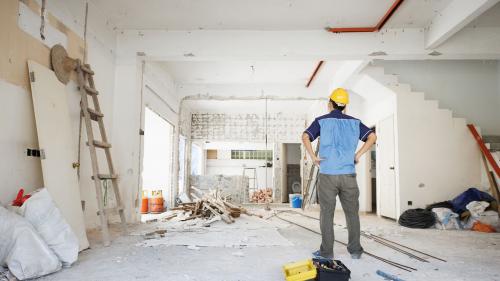What are the Best Ways to Finance Home Renovations?

What are the Best Ways to Finance Home Renovations?
By tapping into your savings, you will be able to renovate your home with little to no debt. You can also refinance your mortgage to obtain a large influx of cash that can be put towards a significant home upgrade.
You can also opt to take on a home equity line of credit. This is a revolving and secured form of credit that allows you to borrow as little or as much as you need for anything you want, including completing your renovation.
Taking on a loan or a personal line of credit are also possible options. A credit card loan, for example, is an unsecured loan. As such, the interest rates will tend to be higher, as there is no collateral available if you default on the loan.
What are the Advantages of a Home Renovation Loan?
Financing a home renovation ensures limited closing costs. The money required for the home improvements will be combined with your mortgage, meaning a single loan will cover both of your needs.
You also do not require collateral with a home renovation loan. If you do provide collateral you will likely get a better deal on your loan, but you could lose your home if you fail to make loan payments. By going with the unsecured option, your bank cannot seize your home if you default on the loan.
An unsecured credit line will ensure that your lender will not factor the equity that you have accumulated in your home in their decision to provide you with the loan. By having these options you can choose the best type of loan for your needs.
A home renovation loan allows you to explore all the customization options you want for your home. You can use the money to remodel the bedrooms completely, add new rooms, or take care of landscaping and painting. Since the additions and renovations you make will increase your home’s curb appeal and real estate value, your home renovation loan can help you to build equity in your home quickly.
Things You Should Consider When Refinancing a Home Renovation
You need to begin by creating a home renovation plan. Determine how much your home renovations will cost and assess your monthly income and expenses.
If you need to borrow some money, use a loan calculator to determine your monthly payments.
Next, you will need to get the capital that you need. You can refinance your existing mortgage, take on a line of credit, or get the funds through a mortgage. You may also need to shop around to find the best financing rate.
Shop around and compare and contrast the rates of the various lenders in the industry. You do not have to settle for your current lender. You also need to determine if the time is right to refinance.
For example, if you can reduce your mortgage interest rate by 0.5% to 0.75% and expect to live in your home for at least three years, refinancing your mortgage may be beneficial.
Certain obstacles may also hinder your refinancing goals. For instance, a high debt-to-income ratio may prove problematic, and a depreciating credit score or income may also prevent you from refinancing.
Furthermore, amalgamating all of your finances with one lender may simplify your finances and provide additional benefits. As can be seen, refinancing a home renovation should be given some serious consideration.
Is it Better to Refinance Before or After a Remodel?
It depends on what you expect to get out of the refinancing and your overall objectives. Refinancing may allow you to take advantage of low-interest rates, translating into lower monthly payments.
By waiting until after the renovations are complete, your refinanced mortgage could give you more money and much lower interest rates since your home has grown in value as a result of the renovations. The more valuable your home is the more money you can borrow from your lender when you refinance your mortgage.
If you are tight on cash, you may want to refinance your mortgage before the renovations start so you can ensure that you can pay for the work.
If you want to get a renovation without affecting your current mortgage,a home renovation loan or home equity loan will be your best bet.
How to Save Money on Your Home Renovation
It is important to formulate a home renovation plan and ensure that you do not exceed your allocated budget.
Labour is not cheap, so anything you can do on your own, such as painting, landscaping, or assisting the renovators can significantly reduce your overall costs. Your top priority should also not be the size of your renovations or additions but efficiency. You also should make sure that the renovations are practical and add value to your home.
Low-end and high-end materials must also be balanced whenever possible, and if you require help, you should ask for it without hesitation. We hope that our guide will be useful when you are ready to refinance your home renovations.
Advertise on APSense
This advertising space is available.
Post Your Ad Here
Post Your Ad Here
Comments